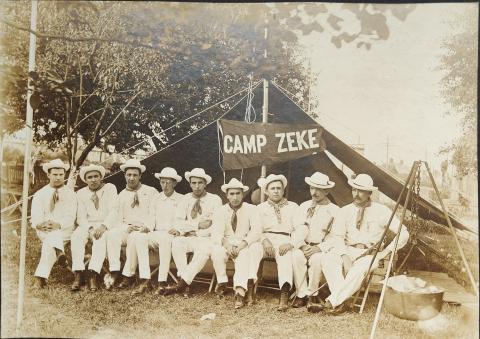CAMP ZEKE provided a place for relaxation and a medium for reminiscence for Cleveland-area veterans of the SPANISH-AMERICAN WAR. The camp existed from the late 1890s until the late 1950s.
Charles Putnam owned a 3-acre farm off Miles Ave. near E. 118th St., and on weekends his property became Camp Zeke for a contingent of some 35 war veterans. Most of the veterans were employed in the nearby American Steel & Wire plant at Jones Rd. and Broadway Ave. After work on Fridays, the group headed to Camp Zeke for the weekend. Members were charged dues of 10 to 20 cents weekly for using camp facilities. These included large tents, which provided a sleeping area, dining hall, supply center, barber shop, and dance hall. During Prohibition the campsite also offered members a chance to brew their own beer. Besides camaraderie, campers also enjoyed lectures on American history and practicing and marching for the camp's fife and drum corps. On Saturday evenings the families of the members would join the men for a weekly dance. One product of the fife and drum corps was Frederick Fennell, who would go on to a distinguished career in music, serving as conductor for the Boston Pops, the Eastman School of Music, and the Interlochen National Music Camp orchestras.
By the 1950s most of the original campers had died, and the camp remained only as a memory. The property remained with the Putnam family, however, and occasionally thought was given to resurrecting the old days. Changing times made that hope unrealistic, and the property was sold in the late 1970s.


